As a chainsaw owner, you know how important it is to keep your equipment well-maintained. One of the most critical components of a chainsaw is the bar and chain oil. This oil lubricates the chain and bar, reducing friction and preventing wear and tear. But what happens if you run out of bar and chain oil? Can you use 10W30 motor oil as a substitute?
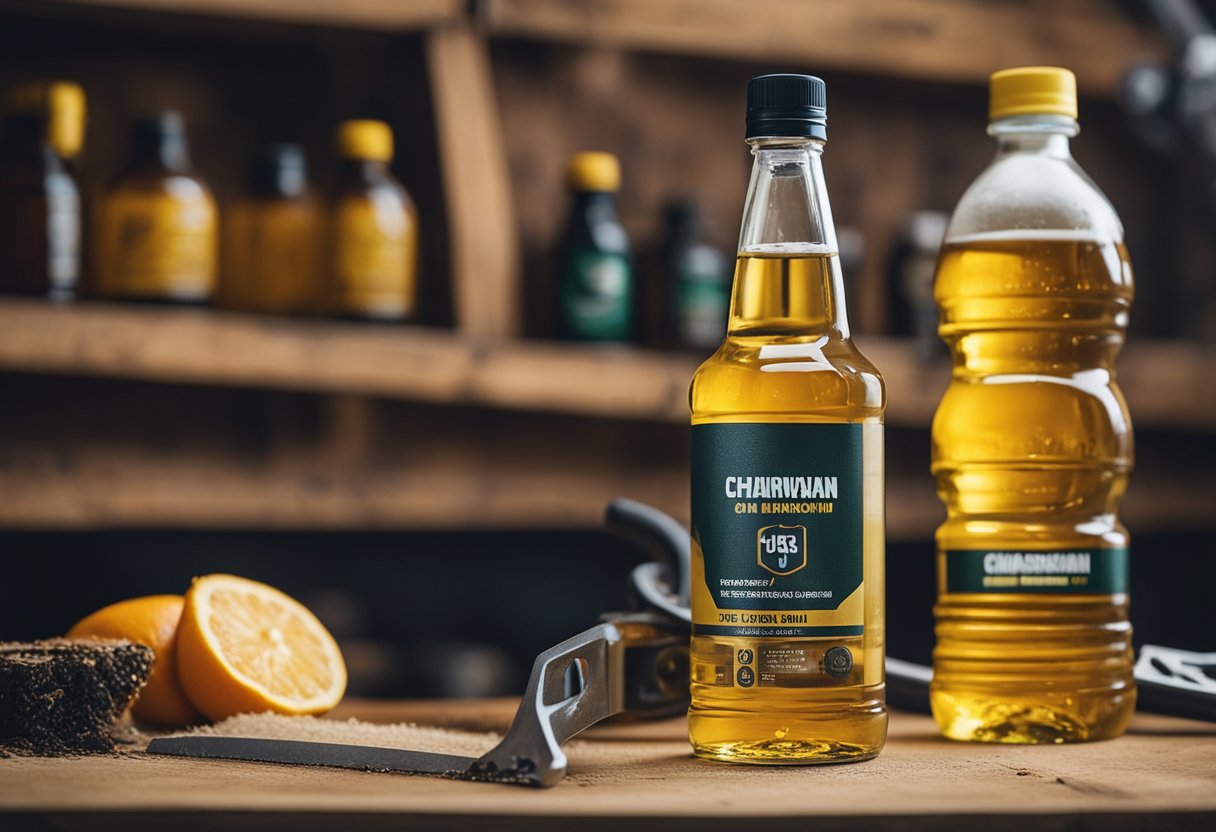
The short answer is yes, you can use 10W30 motor oil as a substitute for chainsaw bar and chain oil. However, it’s not recommended for extended use. Motor oil is thinner than bar and chain oil and lacks the necessary additives to provide adequate lubrication. Using motor oil can result in increased wear and tear on your chainsaw, reducing its lifespan. Additionally, motor oil can be more likely to splash, resulting in less effective lubrication. In this article, we’ll explore the pros and cons of using 10W30 motor oil as a substitute for chainsaw bar and chain oil and provide guidance on choosing the right oil for your chainsaw.
Key Takeaways
- 10W30 motor oil can be used as a substitute for chainsaw bar and chain oil, but it’s not recommended for extended use.
- Using motor oil can result in increased wear and tear on your chainsaw and may be less effective at lubricating.
- It’s important to choose the right oil for your chainsaw to ensure optimal performance and longevity.
Understanding Chainsaw Bar and Chain Oil
As a chainsaw owner, I understand the importance of using the right type of oil for my bar and chain. The chainsaw bar and chain oil is a specially formulated lubricant that provides maximum protection against wear and tear.
The chainsaw bar and chain oil is designed to lubricate the chain and bar, ensuring that the chain moves smoothly along the bar without any friction. This lubrication also helps to reduce the amount of heat generated during use, which can cause damage to the chainsaw.
Using the wrong type of oil, such as motor oil like 10w30, can cause damage to the chainsaw’s engine, resulting in costly repairs or replacement. Chainsaw bar and chain oil has additives that are specifically designed to provide the necessary lubrication and protection for the bar and chain.
It is important to note that chainsaw bar and chain oil is not the same as other lubricants. Other lubricants may not have the necessary additives to provide the required protection against wear and tear. Therefore, it is recommended to use only chainsaw bar and chain oil for your chainsaw.
In summary, using the correct type of oil is crucial for the proper functioning and longevity of your chainsaw. Chainsaw bar and chain oil is specially formulated to provide the necessary lubrication and protection against wear and tear. Using other types of lubricants, like 10w30, can cause damage to the chainsaw’s engine and result in costly repairs or replacement.
The Role of Viscosity in Lubrication
As a handyman, I know that lubrication is an essential part of maintaining the performance and longevity of a chainsaw. One of the most important factors to consider when choosing a chainsaw bar oil is viscosity. Viscosity refers to the thickness of the oil and its ability to flow.
The viscosity rating of an oil is indicated by a combination of numbers and letters, such as 10w30, 5w30, or 10w40. The “w” stands for winter, and the number before it represents the oil’s viscosity at low temperatures. The lower the number, the more easily the oil flows in cold weather. The number after the “w” represents the oil’s viscosity at high temperatures. The higher the number, the thicker the oil and the more resistance it has to flow.
The Society of Automotive Engineers (SAE) has established a viscosity rating system that helps consumers choose the right oil for their specific needs. This system assigns a number to each oil based on its viscosity at different temperatures. For example, a 10w30 oil has a viscosity rating of 10 at low temperatures and 30 at high temperatures.
When it comes to chainsaw bar oil, 10w30 is a popular choice. This oil provides adequate lubrication and wear protection for the chainsaw’s engine, while also reducing noise. Additionally, 10w30 oil is a blend of synthetic and mineral oils, making it suitable for a wide range of engines.
It’s important to note that viscosity alone does not determine an oil’s lubricity. Lubricity refers to an oil’s ability to reduce friction and wear. While viscosity is an important factor in lubrication, other additives such as detergents, dispersants, and anti-wear agents also play a crucial role in protecting the engine.
In conclusion, choosing the right chainsaw bar oil is crucial for maintaining the performance and longevity of your chainsaw. Viscosity is an important factor to consider, but it’s not the only one. Be sure to choose an oil that provides adequate lubrication and wear protection, and always follow the manufacturer’s recommendations for oil type and viscosity.
10W30 Motor Oil as an Alternative
As a professional handyman, I often get asked if 10W30 motor oil can be used as an alternative to chainsaw bar oil. The short answer is yes, it can. However, there are some important factors to consider before using 10W30 motor oil in your chainsaw.
Firstly, it is important to note that chainsaw bar oil is specifically designed to provide superior lubrication and protection to the chainsaw bar and chain. Using 10W30 motor oil as an alternative may not provide the same level of protection and may cause increased wear and tear on your chainsaw over time.
Secondly, 10W30 motor oil is not as sticky as chainsaw bar oil, which may cause oil loss and make your worksite messier. This can be a major drawback, especially if you are working in a sensitive environment or on a project that requires a clean workspace.
Lastly, while using 10W30 motor oil as an alternative to chainsaw bar oil may be more affordable, it may lead to increased maintenance costs over time. This is because motor oil may not protect as effectively against the high friction of chainsaw operation, which can cause increased wear and tear on your chainsaw.
In conclusion, while it is possible to use 10W30 motor oil as an alternative to chainsaw bar oil, it is not recommended for long-term use. If you do decide to use 10W30 motor oil, make sure to monitor your chainsaw closely for signs of wear and tear, and be prepared to perform maintenance more frequently.
Impact of Oil Choice on Chainsaw Performance
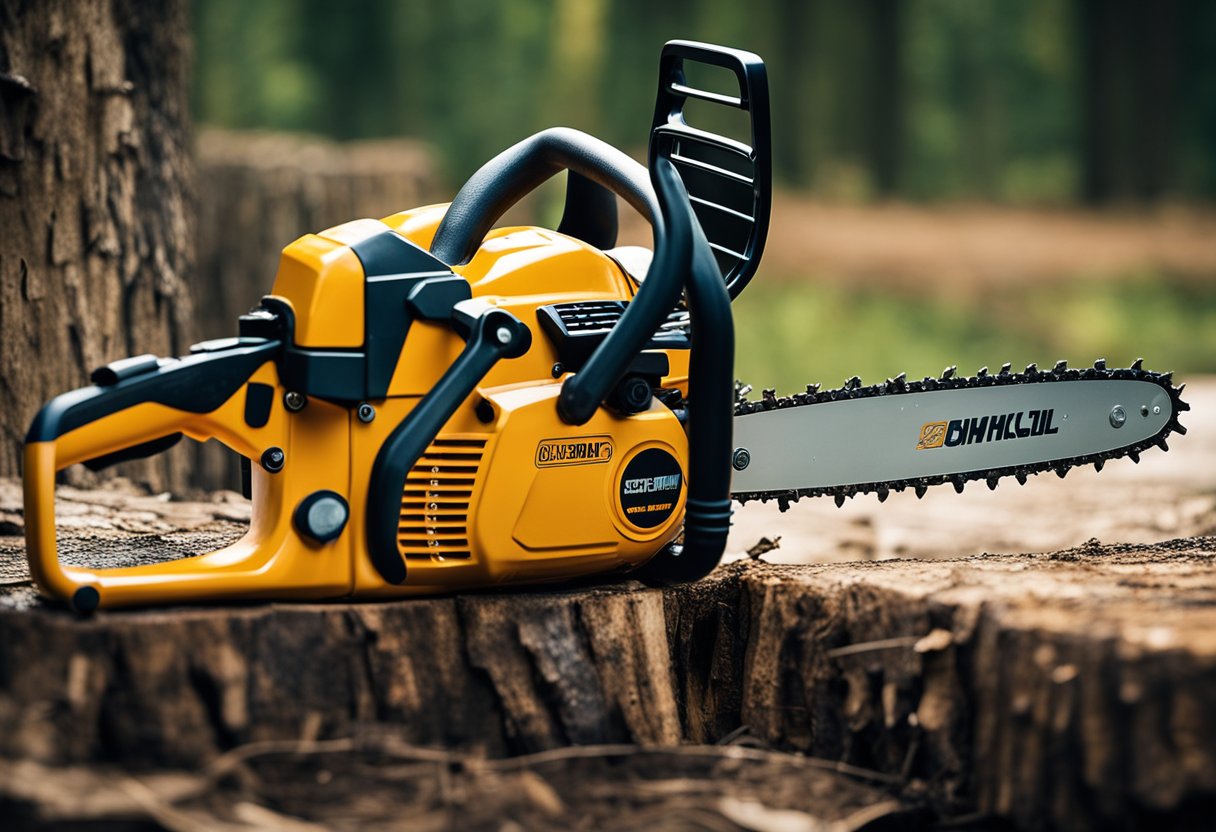
As a professional handyman, I have seen many people use different types of oils for their chainsaws, including motor oil like 10w30. While it is possible to use 10w30 as a substitute for chainsaw bar oil, it is usually not recommended for long-term use.
Using the right oil for your chainsaw is crucial for optimal performance and efficiency. Chainsaw bar oil is specifically tailored to provide superior lubrication and wear protection to the chainsaw bar and chain. Using the wrong oil can lead to overheating, increased wear, and decreased wear protection.
When you use the right oil, you can experience a smooth cut, which is crucial for achieving the best results. The right oil will also help your chainsaw last longer and reduce the need for maintenance.
On the other hand, using the wrong oil can lead to increased wear and tear, which can ultimately result in costly repairs or replacement. It is important to stick with the recommended bar and chain oils to extend the life of your chainsaw.
In conclusion, using 10w30 motor oil as chainsaw bar oil is not recommended for long-term use. It is important to use the right oil for your chainsaw to ensure optimal performance, efficiency, and wear protection.
Considerations for Environmental Impact and Safety
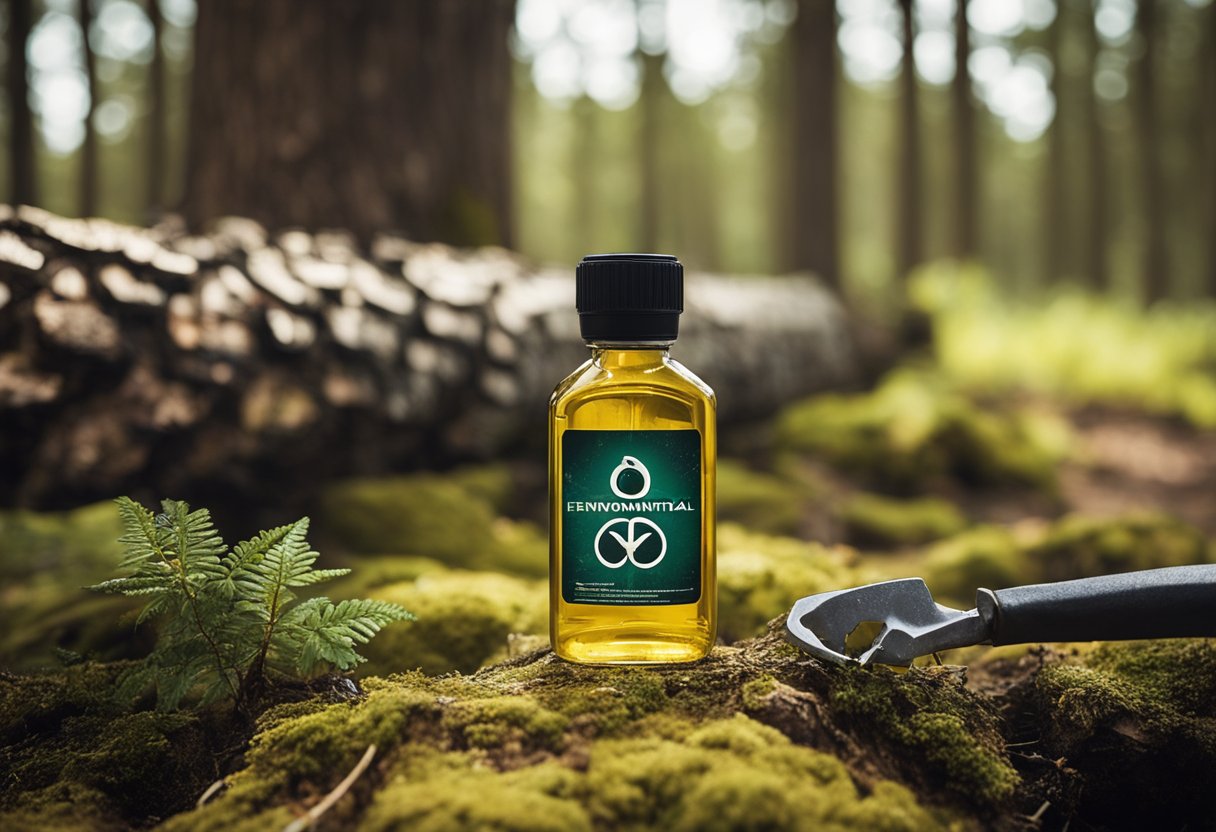
When it comes to chainsaw bar oil, it is important to consider the environmental impact and safety of the oil you choose. While 10w30 oil is a common substitute for chainsaw bar oil, it is not necessarily the most eco-friendly or safe option.
One alternative to traditional chainsaw bar oil is biodegradable oil. Biodegradable oil is designed to break down naturally in the environment, reducing the impact of oil spills and leaks. Some biodegradable oils are also vegetable-based, making them a more eco-friendly alternative to traditional petroleum-based oils.
Another option is vegetable oil or canola oil. These oils are also biodegradable and eco-friendly, but they may not provide the same level of lubrication as traditional chainsaw bar oil. It is important to test these oils before using them as a substitute to ensure they provide adequate lubrication and protection for your chainsaw.
When it comes to safety, it is important to choose an oil that is not only safe for the environment but also safe for you to use. Some biodegradable oils may be less toxic than traditional chainsaw bar oil, but it is important to read the label and follow all safety precautions when using any type of oil.
Ultimately, the best option for chainsaw bar oil will depend on your specific needs and preferences. Consider factors such as environmental impact, safety, and performance when choosing an oil for your chainsaw.
Maintenance and Longevity of Chainsaw Bar

Maintaining and prolonging the lifespan of your chainsaw bar is crucial to ensure that it remains in top working condition. One of the essential aspects of maintaining your chainsaw bar is ensuring that it is properly lubricated. Chainsaw bar oil is specifically designed to lubricate the chainsaw bar and chain, reducing friction and wear and tear.
Using the wrong type of oil, such as 10w30 motor oil, can cause premature rusting and corrosion of the chainsaw bar. Rust can weaken the chainsaw bar, leading to potential safety hazards. Therefore, it is important to use the recommended chainsaw bar oil for your chainsaw.
To prevent rust and corrosion, it is essential to clean and dry your chainsaw bar after each use. This can be done by wiping it down with a dry cloth and storing it in a dry place. Additionally, it is recommended to use a protective coating on your chainsaw bar to prevent rust and corrosion.
Regular maintenance of your chainsaw bar will ensure that it remains in good working condition for a long time. Some maintenance tips include sharpening the chainsaw chain regularly, checking the tension of the chain, and inspecting the chainsaw bar for any damage or wear and tear.
In conclusion, using the appropriate chainsaw bar oil and regularly maintaining your chainsaw bar will ensure its longevity and safe operation.
Choosing the Right Oil for Your Chainsaw
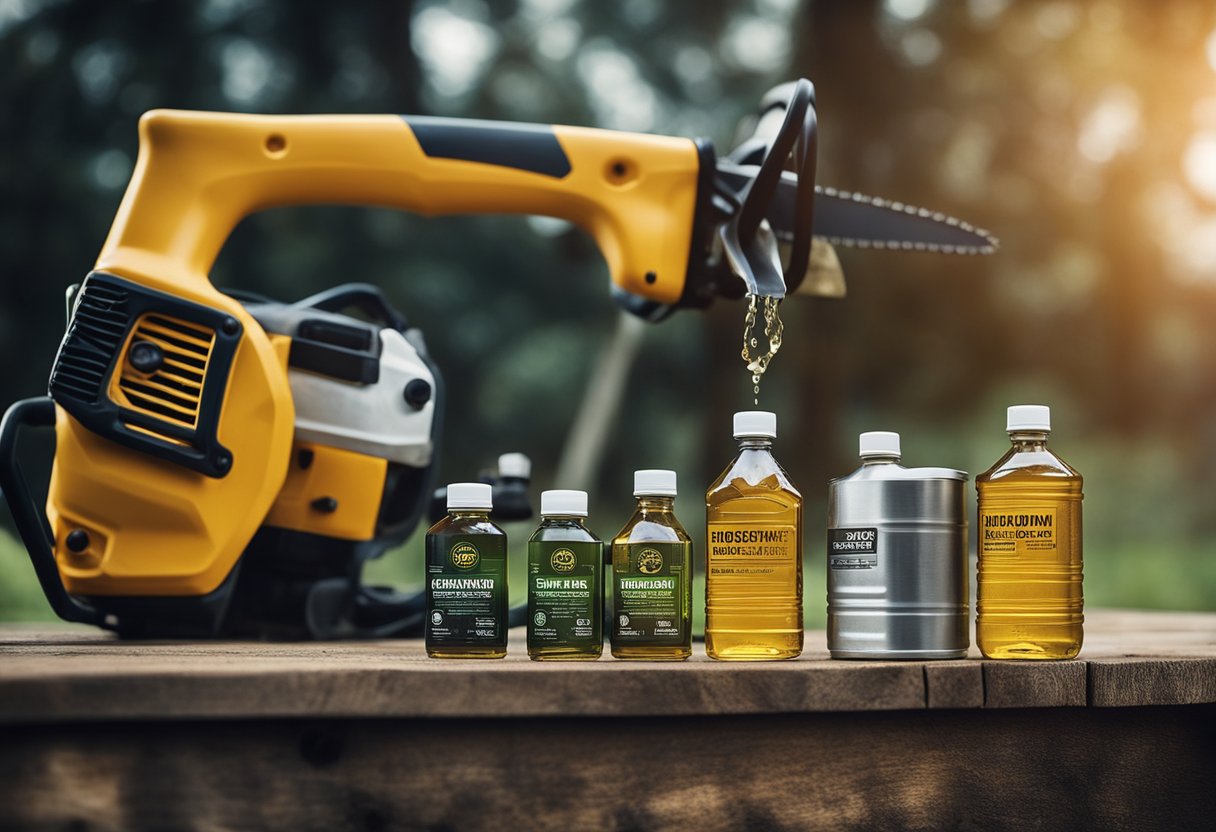
As a handyman, I know that choosing the right oil for your chainsaw is crucial to ensure its optimal performance and longevity. It is important to use a lubricant that is compatible with your chainsaw’s engine and bar, and that can withstand high temperatures and extreme weather conditions.
When it comes to selecting the right oil, it is important to follow the manufacturer’s recommendations. Using a different type of oil can damage your chainsaw’s engine and void its warranty. Some brands may offer their own proprietary oil, which is specially formulated to work with their chainsaws. Using a different brand of oil may also affect your chainsaw’s performance and longevity.
It is also important to consider the climate and temperature conditions in which you will be using your chainsaw. For example, if you are working in a hot climate, you may want to use an oil that can withstand higher temperatures.
While some people may wonder if they can use 10w30 oil as a substitute for chainsaw bar oil, it is not recommended. Chainsaw bar oil is specially formulated to lubricate the chain and bar, providing maximum protection against wear and tear. Using motor oil such as 10w30 can cause damage to your chainsaw’s engine, resulting in costly repairs or replacement.
In summary, choosing the right oil for your chainsaw is crucial to ensure its optimal performance and longevity. Always follow the manufacturer’s recommendations, consider the climate and temperature conditions, and avoid using substitutes such as 10w30 motor oil.
Economic and Accessibility Factors
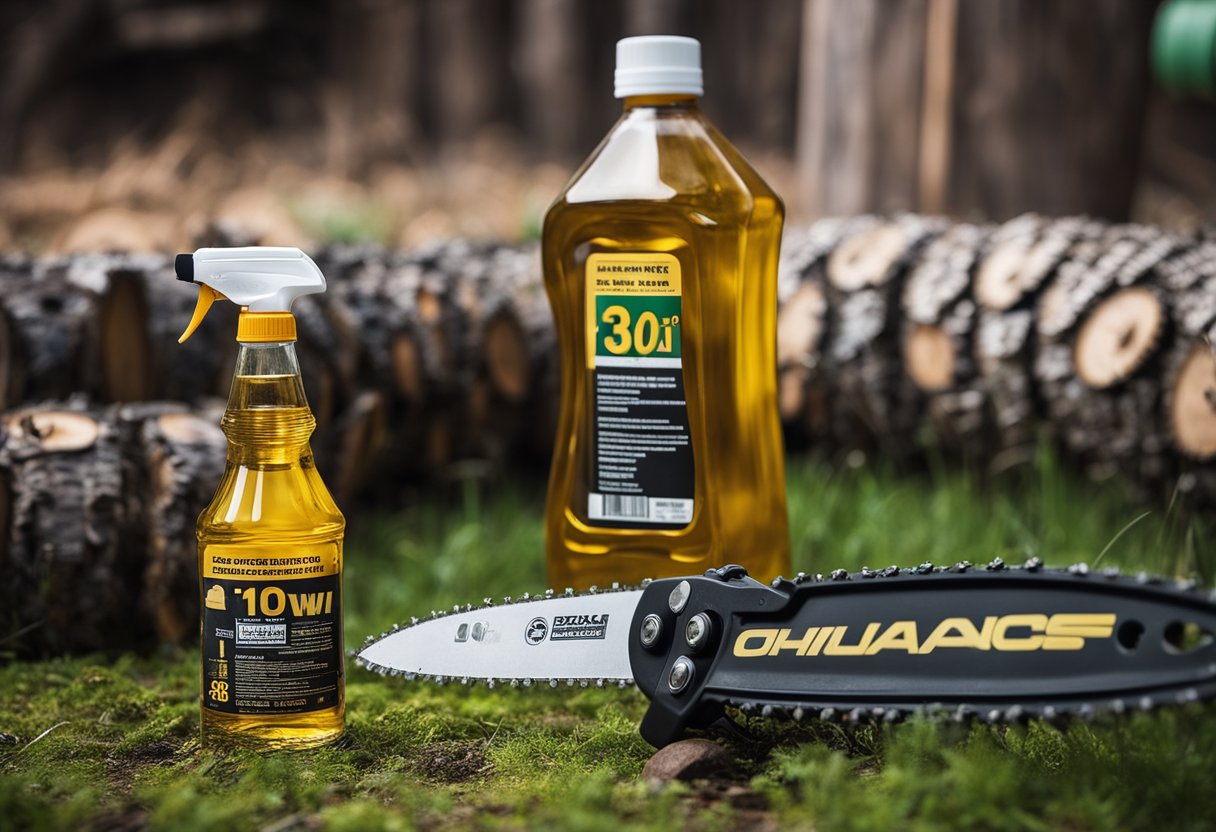
When it comes to using 10W30 motor oil as a substitute for chainsaw bar oil, there are a few economic and accessibility factors to consider. While chainsaw bar oil is specially formulated to provide maximum protection against wear and tear, it can be expensive and difficult to find in some areas. In contrast, 10W30 motor oil is readily available and generally more cost-effective.
Using 10W30 motor oil as a substitute for chainsaw bar oil can result in cost savings, as it is typically less expensive than chainsaw bar oil. Additionally, since 10W30 motor oil is more widely available, it can be easier to find in a pinch. However, it is important to note that using 10W30 motor oil may not provide the same level of protection as chainsaw bar oil.
While using 10W30 motor oil as a substitute for chainsaw bar oil may be a more accessible and cost-effective option, it is important to weigh the potential risks and benefits before making the switch. It is also important to note that using the wrong type of oil can cause damage to your chainsaw’s engine, resulting in costly repairs or replacement. Therefore, it is recommended to use chainsaw bar oil whenever possible to ensure the proper maintenance and longevity of your chainsaw.
Frequently Asked Questions
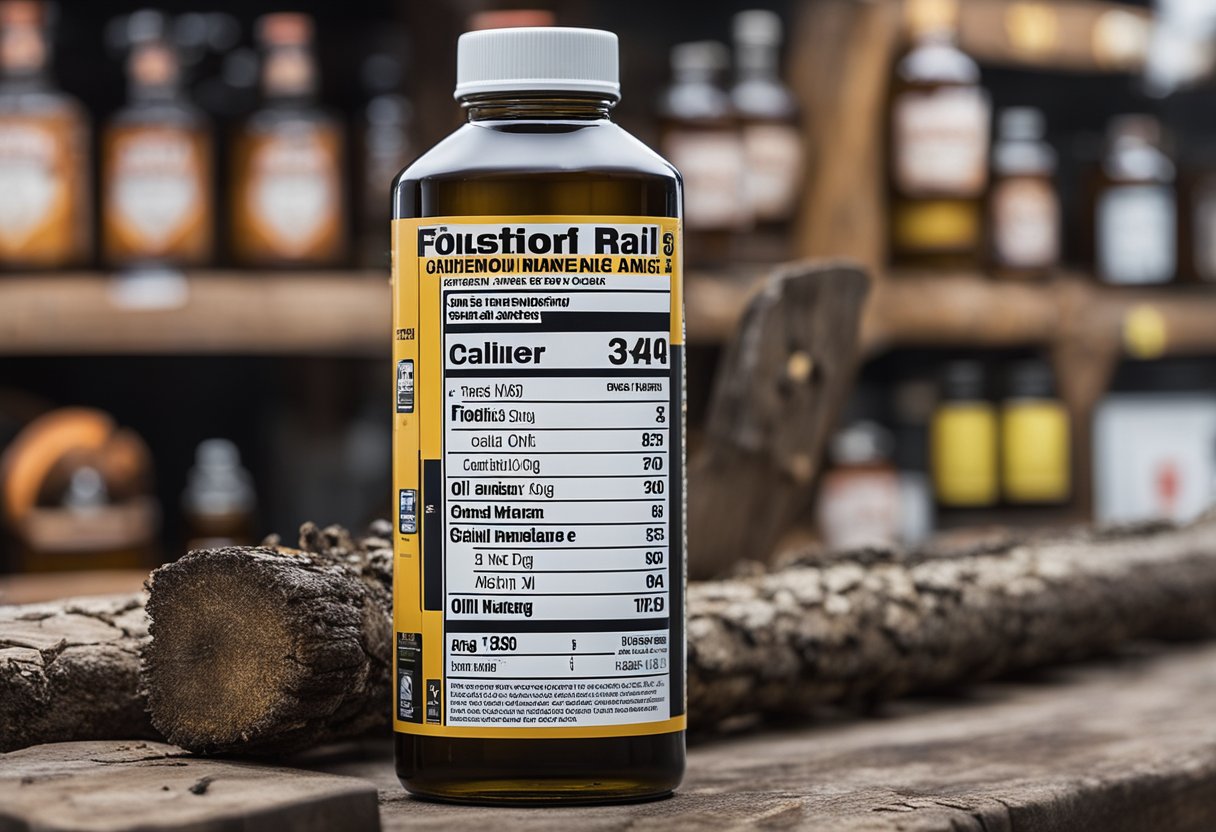
What kind of oil can I use for chainsaw bar oil?
It is recommended to use chainsaw bar oil for lubricating the chain and bar of your chainsaw. This is because chainsaw bar oil is specifically designed to stick to the chain and bar, reducing wear and ensuring efficient operation. Using other types of oil, such as motor oil or vegetable oil, can cause damage to your chainsaw and reduce its lifespan.
Can I use 10w40 for chainsaw bar oil?
It is not recommended to use 10w40 motor oil for chainsaw bar oil. This is because 10w40 motor oil is too thin and lacks the proper additives to provide adequate lubrication for your chainsaw bar and chain. This may result in increased wear and tear on your chainsaw.
Can I use 5w30 for chainsaw bar oil?
It is not recommended to use 5w30 motor oil for chainsaw bar oil. This is because 5w30 motor oil is too thin and lacks the proper additives to provide adequate lubrication for your chainsaw bar and chain. This may result in increased wear and tear on your chainsaw.
Can I use SAE 30 for chainsaw bar oil?
SAE 30 motor oil can be used as a substitute for chainsaw bar oil, but it is not recommended. This is because SAE 30 motor oil is too thin and lacks the proper additives to provide adequate lubrication for your chainsaw bar and chain. This may result in increased wear and tear on your chainsaw.
Can you use vegetable oil instead of chainsaw bar oil?
It is not recommended to use vegetable oil as a substitute for chainsaw bar oil. This is because vegetable oil lacks the proper additives to provide adequate lubrication for your chainsaw bar and chain. Using vegetable oil can cause damage to your chainsaw and reduce its lifespan.
Can I use 10w30 oil in my chainsaw?
10w30 motor oil can be used as a substitute for chainsaw bar oil, but it is not recommended. This is because 10w30 motor oil is too thin and lacks the proper additives to provide adequate lubrication for your chainsaw bar and chain. This may result in increased wear and tear on your chainsaw. It is best to use chainsaw bar oil for lubricating the chain and bar of your chainsaw.

Hi, I’m Sal Muller of Tooltrip.com. My DIY experience led me to understand essential power tools for home projects. Tooltrip.com guides enthusiasts and professionals in choosing right tools for any job. I provide concise top tool reviews for easier, efficient DIY.

